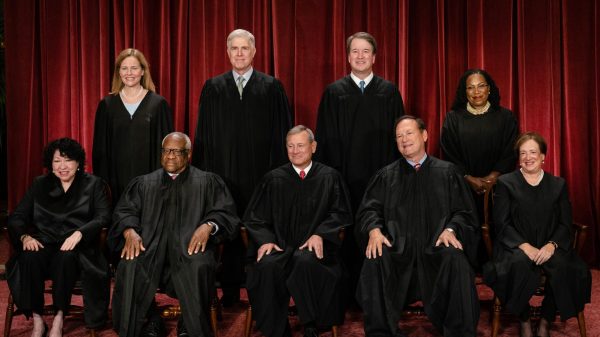Supreme Court considers Affirmative Action in college admissions
Futures are being formed as the high school class of 2023 approaches the end of the college admissions season.
However, a single Supreme Court case may determine the future of the admissions process.
Affirmative Action is a set of policies many U.S universities use to provide underrepresented populations, such as Black and Hispanic students, with opportunities.
These policies were challenged in recent Supreme Court cases on the basis that they discriminate against white, Pacific Islander, and Asian Americans applying to college.
People argue that this would violate Section 601 of the Civil Rights Act of 1964, which states, “No person in the United States shall, on the ground of race, color, or national origin, be excluded from participation in, be denied the benefits of, or be subjected to, discrimination under any program or activity receiving Federal financial assistance.”
The court finished hearing arguments on Nov. 2 for two separate lawsuits against different universities for their use of Affirmative Action: Harvard University and the University of North Carolina at Chapel Hill.

These universities have been accused of denying admissions to white, Pacific Islander, and Asian Americans in favor of students of different races, regardless of their grades. The plaintiff, Students for Fair Admissions (SFFA), is an organization headed by legal strategist and conservative political activist, Edward Blum.

Blum previously challenged the legality of the Voting Rights Act of 1965, which aimed to prevent voter suppression and had parts of the law struck down. However, this new endeavor has gained even more supporters.
The SFFA has over 20,000 members and states its mission is to “support and participate in litigation that will restore the original principles of our nation’s civil rights movement: A student’s race and ethnicity should not be factors that either harm or help them
The outcome of these cases could possibly make the consideration of students’ ethnicities illegal in the college admissions process.
The most recent time the Supreme Court ruled on affirmative action was in the 2016 case, Fisher v. University of Texas, which resulted in a 4-3 vote to protect Affirmative Action.
This took place when the majority of the justices voted liberally. With a 6-3 conservative majority on the Supreme Court, affirmative action is more likely to be reversed than ever.

Blum argues that since four out of the nine current Justices attended Harvard University or Harvard Law School, their verdict could possibly be skewed.
Students from all across the country have come out to advocate against the policy. Many were disheartened that they experienced rejection due to their race, despite their qualifications..
One of them is Calvin Yang, a University of California at Berkeley (UC Berkeley) sophomore and Students for Fair Admissions member, who was disheartened by his Harvard rejection, which he believes was discriminatory.
“Most Americans don’t want race to be part of your application to college,” said Yang. “They don’t want the police to use race as a profiling tool to prevent crime. They don’t want prosecutors to use race in the makeup of a jury. Your race and your ethnicity should not be something used to help you or harm you in your life’s endeavors.”
This was supported by Blum, who claims that according to Pew Research Center, 74% of Americans are opposed to Affirmative Action.
Blum also attacked the policy for being, “unfair, unnecessary, and unconstitutional” as well as against, “the original principles of our nation’s civil rights movement”
In response, Harvard called race a factor in what they call “holistic admissions”, a process that looks at all parts of a student’s application in order to create a diverse campus.
They also claim they do not deny students admission based on their race, and that Affirmative Action is a positive factor for those it helps get accepted into college.
Harvard responded to the claims, stated that the lawsuit was “politically motivated” and released statistics about their admissions.

In the 2021 college admissions cycle, Harvard received over 60,000 applications and only admitted 2,000 students. Over 8,000 had 4.0 GPAs and 4,000 were the valedictorians in their high Schools.
Test scores were also competitive with over 20,000 applicants having SAT Math scores over 700 as well as 18,000 for the Reading test.
In order to justify why students with higher scores were not accepted, they claimed that along with grades and test scores, extracurricular activities, accomplishments, essays, and letters of recommendation, are also considered.
Both sides of the Affirmative Action debate want the best for students, but now the Supreme Court has the responsibility of deciding the laws that control who gets to attend their dream college.





